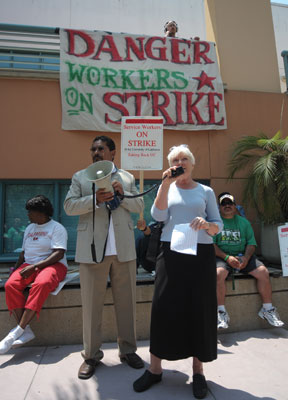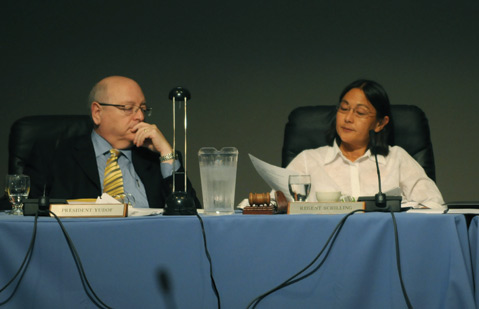Workers Picket as UC Governing Board Convenes at UCSB
A Primer on the Regents

The number of protestors marching at UCSB increased on the second day of a strike by service and health care workers across the University of California system who are represented by the American Federation of State, County, and Municipal Employees (AFSCME). Tuesday morning, July 15, in anticipation of the arrival of the UC Regents for a meeting at UCSB’s Corwin Pavilion, AFSCME bused in striking workers from all over the state to protest what they say is UC’s failure to bring a reasonable offer to negotiations that have not yet even begun. At least 200 protesters were present, wielding signs and chanting slogans in English and Spanish. There was a high concentration of law enforcement personnel in the area as well, and the regents’ meeting place was cordoned off from the public.
In a press release, UC stated a commitment to increasing its healthcare workers’ pay by up to 26 percent over the next six years, and increasing service workers’ wages from $10.82 to as much as $12 per hour. However, service workers want at least $15 per hour to keep up with the rising costs of living in an area known to be expensive. “Eight years ago, it was fun to work here-not anymore,” said Tony Ortiz, who has worked at UCSB for 15 years. “We were one of the top paid jobs in Santa Barbara County then. Now we’re one of the lowest paid.” Richard Haug, who has been a grounds worker at UCSB for three years, said that he initially began working for the university because of the decent pay and solid benefits. “I’ve had an increase in pay of less than $100 over the last three years,” he said. UC officials said in a press release on July 15 that they viewed the strike, scheduled to last for five days, as illegal, and expressed disappointment at what they said was an unwillingness by union officials to meet for negotiations.

With the shouts of protest from the striking workers outside fading faintly into background noise from inside UCSB’s Corwin Pavilion, the UC Board of Regents voted on Tuesday to authorize more funding for the construction of two new environmentally friendly buildings at two different campuses-Berkeley and Santa Cruz-despite complaints from a few voting members that the efforts to create more sustainable structures at public university campuses is too expensive an endeavor.
Led for the first time at this meeting by newly appointed UC president Mark G. Yudof, who took office May 1, the regents-on the first day of their three-day conference-also listened to the concerns of several student activist groups who spoke during the public comment period. UC Irvine Medical School student Timothy Minh, for example, spoke on behalf of the UCI-based Universities Allied for Essential Medicines, which wants UC to facilitate the use of its intellectual property for the manufacture of generic drugs for distribution in needy countries.
Since the University of California system was founded in 1868 with the establishment of a fledgling campus in Berkeley, more than 400 individuals have served on the UC’s prestigious Board of Regents-the large and powerful (and somewhat mysterious) chief governing body that decides the direction of 10 of the nation’s leading research and education institutions. Yet its deliberations are no more remarkable than those of the County Board of Supervisors and other familiar governing bodies closer to home.
Eighteen of the board’s current 26 members-comprised of both public servants and private citizens, many of them accustomed to decision-making roles in large corporations-are appointed by California’s governor to serve 12-year terms. Ten of these members are the chancellors from each of the UC campuses.
Seven higher-ranking members-known formally as “ex-officio officers”-also sit on the Board of Regents. The majority of members in this elite sub-group group are persons who currently hold high-level public offices in California’s state government-like the governor, lieutenant governor, and state speaker of the Assembly. Most of these ex-officio members rarely participate in typical regent affairs. Many, in fact (Governor Arnold Schwarzenegger for example), have never attended a workday meeting like the one at UCSB this week, and aren’t expected to. Regents’ meetings are typically held six times a year, rotating each time among the different campuses.
The final position on the board belongs to the Student Regent, an annually appointed position held by one UC student, who is selected from a pool of around 75 other hopefuls by an official regents’ committee. The position-an established post since 1975-has its roots in local ground: It was instituted, among other reasons, as a response to intense anger and demands for representation from a large majority of UC students during the student protest movement at UCSB and Isla Vista during the 1970s. And, not only was UCSB instrumental in instituting the Student Regent position, but the first post was given to Gaucho political science major and activist Carol Lynn Mock.
Though more than 35 years of having a Student Regent sit on the board have somewhat dulled the glamorous ferocity and rebellion that used to characterize the position, the board’s choice for the Student Regent for this upcoming school year-who is to be officially appointed to his post by the regents Wednesday morning-is again from UCSB, the first Gaucho to secure the position in more than a decade. UCSB graduate student and Westmont alumnus Jesse Bernal, who is pursuing a doctorate in education at the campus’s Gevirtz School, was selected from among 65 other student candidates from all 10 UC campuses. He will officially trade in his title of “regent-designate”-a non-voting position the Student Regent must assume for the first half of the two-year term-on Wednesday morning for full voting rights on the board, a rather important transition to possessing the only representative power on the board for all UC undergraduate and graduate students statewide.
On Wednesday, Bernal’s first day as a voting member, the regents were scheduled to consider a proposal for reforming UC’s freshman eligibility policy, which, if passed, would impact high school students throughout the state by changing the grade-point standards, unit acquisition, and subject requirements. They also expected to hear from representatives of the striking workers, and possibly to respond. On Thursday, the board is scheduled to discuss the recent proposal to establish a new medical school at UC Riverside, and retirement plan funding.



